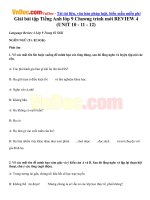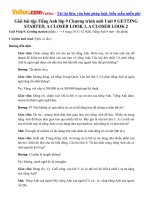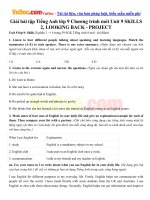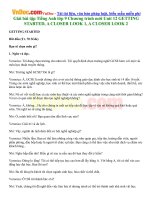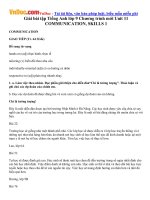Tải Giải SGK Unit 4 lớp 12 School education system Listening, Writing, Language focus - Giải bài tập tiếng Anh 12 Unit 4 School education system đầy đủ nhất
Bạn đang xem bản rút gọn của tài liệu. Xem và tải ngay bản đầy đủ của tài liệu tại đây (126.61 KB, 7 trang )
<span class='text_page_counter'>(1)</span><div class='page_container' data-page=1>
<b>GIẢI SGK </b>
<b>TIẾNG ANH LỚP 12 </b>
<b> THEO TỪNG UNIT</b>
<b>UNIT 4: SCHOOL EDUCATION SYSTEM</b>
<b>C. Listening trang 48 SGK Tiếng Anh 12 Unit 4</b>
<b>Work in pairs. Ask and answer the questions. (Làm việc từng đôi. Hỏi và trả lời</b>
<b>các câu hỏi.)</b>
- I'm good at Maths and Physics.
- Certainly I enjoy Maths and Physics most as they are my favourite subjects. I find them interesting
because these subjects relate to all things which happen in my life and the nature, for example the
rule of expansion of solid substances,...
The subject I enjoy least is, to tell the truth, political education. At my age I think I cannot
understand any concepts or thoughts on it. Therefore I find it very boring. What ideologies or
political doctrines mean is nothing to our little mind.
<b>❖ While You Listen</b>
<b>Task 1: Listen to the conversation between Jenny and Gavin. Pul a tick ( ) to✓</b>
<b>the question to which the answer is "Yes". (Lắng nghe bài đổi thoại giữa Jenny</b>
<b>và Gavin. Đặt dấu ( ) vào câu hỏi có câu trả lời là "Yes")✓</b>
Jenny gavin
1 Did you always work very hard? V V
</div>
<span class='text_page_counter'>(2)</span><div class='page_container' data-page=2>
teacher?
3 Did you always behave well V
4 Did you pass your exam easily?
5 Did you always write your homework
slowly and carefully?
V V
6 Did you think school days are/ were the
best days of your life?
<b>❖ Tapescript</b>
Jenny : Look, these are questions about how you got on at school?
Gavin : Yes, let's.
Jenny : OK, so did you always work very hard?
Gavin : Well, I certainly worked pretty hard at the subjects I enjoyed. Yes, I did. What about you?
Jenny : Yes, I did actually. I think I worked very hard, yeah. Now let's come to the next question.
Gavin : Did, yeah, did you always listen carefully to your teachers?
Jenny : No, I don't think I did. No, I think I was quite disruptive, actually. What about you?
Gavin : Well, I think I did listen to the teachers certainly when I got to the level where I was doing
the subjects that I enjoyed.
</div>
<span class='text_page_counter'>(3)</span><div class='page_container' data-page=3>
Gavin : I don't think I always behaved well. I was a bit, er, a bit of a tearaway.
Jenny : Um. Well, I think I was pretty well-behaved on the whole, so I 'd say yes, yeah.
Gavin : Good for you.! Did you pass your exams easily?
Jenny : No, I can't say I did. No, I, I found them quite a struggle, actually. What about you?
Gavin : I didn't pass them that easily, though I worked hard I found it very difficult to answer all that
lone questions in a short time.
Jenny : Yeah, yeah, exactly. What about this one, then? Did you always write slowly and carefully?
Gavin : Quite slowly. Essays took a long time to write and I suppose I took a bit of care, yes.
Jenny : Yes. I agree. I was also. I was very careful and erm, yeah, yeah I was quite methodical.
Gavin: And did you think your school days were the best days of your life?
Jenny : Um, no, no. I can't say they were. What about you?
Gavin : No, I went away to a boarding school when I was quite young and I didn't like that. No, they
weren't the best days of my life.
<b>Task 2. Listen again and answer the questions. (Lắng nghe và trả lời câu hỏi.)</b>
1. When he enjoyed the subjects.
2. He found them very difficult.
</div>
<span class='text_page_counter'>(4)</span><div class='page_container' data-page=4>
4. Because he went to a boarding school far away his home when he was quite young and he didn't
like that. So, he found his schooldays were not the best days of his life.
<b>❖ After You Listen</b>
<b>Work ill pairs. Talk about the results of your current exams at school and what</b>
<b>you will do to prepare for the next exams. (Làm việc từng đơi. Nói về các kết</b>
<b>quả của những bài thi của em hiện nay ở trường và những gì em sẽ làm để chuẩn</b>
<b>bị cho những bài thi kế.)</b>
A. How arc the results of your current exams?
B. They're not very good; actually, except for my major subjects :Maths and Physics, all others are
bad.
A. Why do you say so?
B. Because I didn't really study them well. It's the obvious result.
A. You mean you didn't do your exercises or homework carefully?
B. Yes. And I didn't listen 10 my teachers attentively enough.
A. What will you do for the next exams?
B. Well, I 'II study more carefully and harder. In class I'll listen to my teachers' explanations more
attentively, do many more exercises and much homework.
</div>
<span class='text_page_counter'>(5)</span><div class='page_container' data-page=5>
A. Sure, I think you should. And good luck to you in your next exams.
B. Thanks a lot.
<b>D. Writing trang 49 SGK tiếng Anh 12 Unit 4</b>
In about 150 words, write a paragraph on the formal school education system in Vietnam, using the
information given in Speaking Tasks on page 47. You may follow the suggestions below. (Trong
150 từ, viết một đoạn văn về hệ thống giáo dục chính quy ở Việt Nam, dùng thơng tin ở Bài tập nói
ở trang 47. Em có theo những lời đề nghị dưới đây.)
The current formal school education in Vietnam consists of three levels : preschool. primary and
secondary educations. Now there are two school systems in preschool and primary education in big
cities : stale and private schools. In state schools, parents have to pay tuition fee. The academic year,
from September to May, is divided into two semesters:, from four to live months each.
Children usually start the pre-school at the age of 3, when they go to nurseries, but this stage is not
compulsory. When children reach the age of 6, they must go to primary schools. The primary
education last five years. When they complete their primary education, they can go to secondary
schools, including Lower and Upper schools, from Grade 6 to 12. However, children must pass a
recruitment exam at the end of Grade 9, the final year of Lower schools, to enter the upper
secondary education. They will stay there until they complete Grade 12. Al the end of this stage,
they must take the National Examination for GCSE, the requirement to go to university or college.
This examination often takes place at the end of May or early June.
</div>
<span class='text_page_counter'>(6)</span><div class='page_container' data-page=6>
<b>Exercise 1: Fill in each blank with the simple present passive form of the verb</b>
<b>in brackets. (Điền mỗi chỗ trống với dạng hiện tại bi động của độnạ từ trong</b>
<b>ngoặc.)</b>
1. is divided 2. is separated 3. is set, must he followed
4. is made up 5. is paid 6. are selected
<b>Exercise 2: Rewrite the following sentences, using the passive voice. (Viết lại</b>
<b>những câu sau, dùng thể bị động)</b>
1. This school was built in 1997.
2. This dictionary was first published in 1870.
3. A surprise party is going to be organized by the students in my class tomorrow evening.
4. The kitchen is being painted now.
5. "Romeo and Juliet" was written by Shakespeare in 1605.
6. Shakespeare's tragedies have been translated into many languages.
7. A new primary school has just been built in my village.
8. English will be spoken at the conference.
9. The floor hasn't been cleaned yet.
</div>
<span class='text_page_counter'>(7)</span><div class='page_container' data-page=7>
<b>Exercise 3: Fill in the spaces of the following passage with the correct tense in</b>
<b>passive voice of the verbs in brackets. (Điền vào chồ trống của đoạn văn sau với</b>
<b>thì đúng ở thể bị động từ động từ trong ngoặc.)</b>
1. was built 2. were sold 3. has been made 4. can be bought
5. are used 6. can be used 7. is kept
8. are done 9. must he told 10. can be done
Mời bạn đọc tham khảo thêm tài liệu Tiếng Anh lớp 12 tại đây:
Bài tập Tiếng Anh lớp 12 theo từng Unit:
Bài tập Tiếng Anh lớp 12 nâng cao:
Bài tập trắc nghiệm trực tuyến Tiếng Anh lớp 12:
</div>
<!--links-->
Giải bài tập tiếng anh lớp 12 Unit 1: Home life
- 10
- 1
- 4

